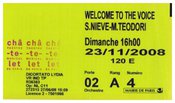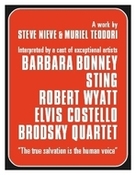
Selected Miscellaneous Shows
Nov
24
2008
Paris, FR
Welcome to the Voice (Théâtre du Châtelet)
A Night at the Opera with Sting and Elvis...
Once again, the Theatre du Chatelet in Paris has given French opera critics a case of the vapors - but this time, two British new wave pop stars are at the center of the uproar. Since Jean-Luc Choplin became director in 2006, the historic opera house's repertoire of classic opera has increasingly taken a back seat to newer, bolder commissions in a bid to make the Chatelet stage a true crossroads for the arts. From a Bollywood-style remake of the 1923 opera-ballet Padmavati, to a stage mutation of the sci-fi horror film 'The Fly', the Chatelet has had opera purists hyperventilating as it seeks to tear down walls between genres.
But perhaps the Chatelet's most ambitious and controversial gambit yet was to transform veteran rockers Sting and Elvis Costello into opera stars... kind of. As Sting qualified it during a TIME interview with the two musicians, "Well, no one is going to offer Elvis and I parts in Tosca, right?" Costello added, "Except 'Spear-Bearer' maybe."
Indeed, the opera 'Welcome to the Voice', which premiered Nov. 20, doesn't demand feats of coloratura of the pair. Rather, they lend their rock timbres to improbable duets with such brilliant sopranos as Sylvia Schwartz to "hopefully make harmony," as Sting says.
The work is the fruit of a genuine romance between the opera's composer, longtime Costello keyboardist Steve Nieve, and the writer and psychoanalyst Muriel Teodori, who wrote the Franco-English libretto. First released as a Deutsche Grammophon recording in 2007, the opera recounts the story of Greek immigrant steelworker Dionysos (played by a bearded Sting), who falls in love with an opera diva, much to the consternation of his blue-collar buddies. His stalker-like obsession nearly gets him incarcerated by the police commissioner (a hulking, black-robed Costello), but with a little supernatural intervention by the ghosts of operas past, all ends well.
The title of the opera refers to the transcendent and reconciliatory power of the human voice, whether scared or profane. However, in the ears of critics at the French dailies, the experiment has proved to be less than pitch-perfect. Le Figaro, for example, declared Welcome to the Voice "rock and opera's wedding gone wrong," slipping into "platitudes." Meanwhile, the daily Liberation, criticized the libretto's "naivete."
Teodori rejects the characterization. "When you're not cynical people say you're naive, and our message is simple and without cynicism," she says. "It's the belief in the virtue of hybrids, of mixing what at first wouldn't seem to go together." Teodori weaves her tale by drawing on age-old themes - the clashes between high and low culture, and the upper and working classes.
For Sting, a singer who grew up delivering milk early mornings with his father in the coal mining and shipbuilding town of Wallsend, England, those themes of class struggle drew him to his character. "There's the Dionysos archetype from Greek mythology, and then there's this communist steelworker who falls in love with the opera - that's the story I'm telling really," he says. "I know what it's like to be an outsider, I know what it's like to be working class and entering the halls of the bourgeois. It's our story really."
The tenets of tragic opera would naturally hold a dire fate for lovers from disparate worlds like Dionysos and Lily. But when the ghosts of Carmen, Butterfly and Norma visit Dionysos in his sleep singing "Opera always kills its lovers," Dionysos brushes off their calls for a proper opero-tragic suicide. "He doesn't want anything to do with that Valhalla tradition celebrating tragedy, pain and death," says Teodori. "And neither do I." It's one of the opera's more effective conceits, and Nieve's arias shine with what one applauding critic called "a true musicologist's reflection on the themes of Bizet, Bellini and Puccini."
Directed by Wolfgang Doerner, the production is self-assuredly modern - not by strident atonalism, but rather through the fertile mixing of jazz, opera, rock and electronica, punctuated by moving, ethereal intermezzos by onstage jazz instrumentalists improvising over the Ensemble Orchestral de Paris. While Le Monde had little appetite for this musical "soup", the Journal de Dimanche was eager for more. "In the breach between rock-pop and opera, [Nieve] invented something new," said the paper's critic. "Despite its faults, this innovation, far superior to all the musical comedies in the works, deserves to be saluted."
Costello and Sting's performances had their faults - including a good handful of wayward notes. But while commissioner Costello stormed around stage brazenly belting his lines, and Sting swooned in the arms of Schwartz's delicious diva during their final stirring - and harmonious - duet, they were clearly reveling in this escape from the confines of the pop-rock genre. "For me it's always good to put yourself outside your comfort zone," says Sting. "As an artist, it's vital to have that kind of experience to grow, otherwise you're trapped in a box. Being in the box is never really interesting - I like to step outside of it, even at the risk of personal failure." The French critics may not agree, but with its easy juxtaposition of styles and obstinately hopeful narrative, 'Welcome to the Voice' does make for a decidedly modern opera. And judging from the packed houses and endless ovations during its five-night Paris run, it seems the vox populi, at least, has declared it a success.
(c) Time by Jeffrey T. Iverson
Once again, the Theatre du Chatelet in Paris has given French opera critics a case of the vapors - but this time, two British new wave pop stars are at the center of the uproar. Since Jean-Luc Choplin became director in 2006, the historic opera house's repertoire of classic opera has increasingly taken a back seat to newer, bolder commissions in a bid to make the Chatelet stage a true crossroads for the arts. From a Bollywood-style remake of the 1923 opera-ballet Padmavati, to a stage mutation of the sci-fi horror film 'The Fly', the Chatelet has had opera purists hyperventilating as it seeks to tear down walls between genres.
But perhaps the Chatelet's most ambitious and controversial gambit yet was to transform veteran rockers Sting and Elvis Costello into opera stars... kind of. As Sting qualified it during a TIME interview with the two musicians, "Well, no one is going to offer Elvis and I parts in Tosca, right?" Costello added, "Except 'Spear-Bearer' maybe."
Indeed, the opera 'Welcome to the Voice', which premiered Nov. 20, doesn't demand feats of coloratura of the pair. Rather, they lend their rock timbres to improbable duets with such brilliant sopranos as Sylvia Schwartz to "hopefully make harmony," as Sting says.
The work is the fruit of a genuine romance between the opera's composer, longtime Costello keyboardist Steve Nieve, and the writer and psychoanalyst Muriel Teodori, who wrote the Franco-English libretto. First released as a Deutsche Grammophon recording in 2007, the opera recounts the story of Greek immigrant steelworker Dionysos (played by a bearded Sting), who falls in love with an opera diva, much to the consternation of his blue-collar buddies. His stalker-like obsession nearly gets him incarcerated by the police commissioner (a hulking, black-robed Costello), but with a little supernatural intervention by the ghosts of operas past, all ends well.
The title of the opera refers to the transcendent and reconciliatory power of the human voice, whether scared or profane. However, in the ears of critics at the French dailies, the experiment has proved to be less than pitch-perfect. Le Figaro, for example, declared Welcome to the Voice "rock and opera's wedding gone wrong," slipping into "platitudes." Meanwhile, the daily Liberation, criticized the libretto's "naivete."
Teodori rejects the characterization. "When you're not cynical people say you're naive, and our message is simple and without cynicism," she says. "It's the belief in the virtue of hybrids, of mixing what at first wouldn't seem to go together." Teodori weaves her tale by drawing on age-old themes - the clashes between high and low culture, and the upper and working classes.
For Sting, a singer who grew up delivering milk early mornings with his father in the coal mining and shipbuilding town of Wallsend, England, those themes of class struggle drew him to his character. "There's the Dionysos archetype from Greek mythology, and then there's this communist steelworker who falls in love with the opera - that's the story I'm telling really," he says. "I know what it's like to be an outsider, I know what it's like to be working class and entering the halls of the bourgeois. It's our story really."
The tenets of tragic opera would naturally hold a dire fate for lovers from disparate worlds like Dionysos and Lily. But when the ghosts of Carmen, Butterfly and Norma visit Dionysos in his sleep singing "Opera always kills its lovers," Dionysos brushes off their calls for a proper opero-tragic suicide. "He doesn't want anything to do with that Valhalla tradition celebrating tragedy, pain and death," says Teodori. "And neither do I." It's one of the opera's more effective conceits, and Nieve's arias shine with what one applauding critic called "a true musicologist's reflection on the themes of Bizet, Bellini and Puccini."
Directed by Wolfgang Doerner, the production is self-assuredly modern - not by strident atonalism, but rather through the fertile mixing of jazz, opera, rock and electronica, punctuated by moving, ethereal intermezzos by onstage jazz instrumentalists improvising over the Ensemble Orchestral de Paris. While Le Monde had little appetite for this musical "soup", the Journal de Dimanche was eager for more. "In the breach between rock-pop and opera, [Nieve] invented something new," said the paper's critic. "Despite its faults, this innovation, far superior to all the musical comedies in the works, deserves to be saluted."
Costello and Sting's performances had their faults - including a good handful of wayward notes. But while commissioner Costello stormed around stage brazenly belting his lines, and Sting swooned in the arms of Schwartz's delicious diva during their final stirring - and harmonious - duet, they were clearly reveling in this escape from the confines of the pop-rock genre. "For me it's always good to put yourself outside your comfort zone," says Sting. "As an artist, it's vital to have that kind of experience to grow, otherwise you're trapped in a box. Being in the box is never really interesting - I like to step outside of it, even at the risk of personal failure." The French critics may not agree, but with its easy juxtaposition of styles and obstinately hopeful narrative, 'Welcome to the Voice' does make for a decidedly modern opera. And judging from the packed houses and endless ovations during its five-night Paris run, it seems the vox populi, at least, has declared it a success.
(c) Time by Jeffrey T. Iverson



